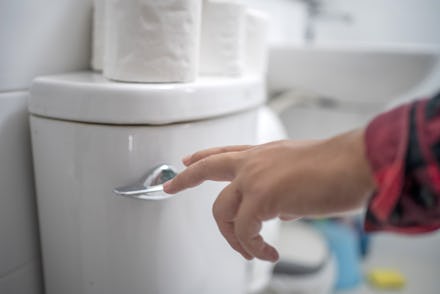When it comes to peeing, how often is too often?

Once election day is over, we'll more or less know the course our country will take. We could find out hours or weeks later, according to some estimates — maybe even months, if the election goes to court. I truly have no clue, but I do know that all this uncertainty has taken physical toll. Over time, election anxiety has traveled from my overactive mind to other parts of my body — namely, my bladder — a problem almost half of us with anxiety deal with, according to one recent Urology study. Unfortunately, an anxious bladder means many more bathroom breaks, and that’s to say nothing of how many times I get up to pee in the middle of the night. But how often is too often? How many times should a healthy adult pee in a day?
To find out, I spoke to experts on the subject. They tell me that stress and anxiety can affect your bladder, causing urinary urgency. This might mean that toilets across the country are flushing a little bit more, as we all anxiously await the election results. “Anxiety or stress can cause the urge to urinate more, as other factors like stress, the weather, and what you eat and drink can affect your bladder,” says Michael Ingber, a New Jersey-based reconstructive surgeon, urologist, and professor of urology at Cornell University. Increased stress or anxiety can often cause increased muscle tension, although scientists don’t fully understand why. “When the pelvic floor muscles (the muscles which surround the bladder, bowels, and pelvic organs) are tense, this can increase urinary urgency and frequency,” Ingber says.
Besides anxiety, “frequency of urination is dependent on several factors, including how much fluids a person is drinking,” says Esther Han, an Florida-based urologist at Orlando Health, adding that basically, if a person is staying hydrated, but not overly so, a tinkle every four to five hours is normal. That means a healthy adult should aim for five to six pee breaks every 24 hours.
Ingber explained urinary frequency in more direct terms. “The first thing I tell patients is, ‘What goes in, goes out.’ So if you're drinking two to three liters of fluid within a 24-hour period, you're going to void more than what would be considered normal,” he says. He also tells me that another big factor that sends people sprinting to the loo is coffee, since caffeine acts as a diuretic, or a liquid that increases the production of urine. Alcohol is also a diuretic, so if it’s wine o'clock at your house — and, with the wait for election results this week, I wouldn’t blame you if that was noon — you’ll likely need a potty break soon after your first glass of cabernet.
Han notes that the average capacity of a bladder is half a liter. So, common sense would dictate that drinking more than that amount would cause your bladder to runneth over, so to speak.
In fact, you can train your bladder to go less, Han adds. She tells me about people with jobs that require a lengthy presence in one spot, like truckers, teachers, construction workers, nurses, doctors, and other long haul occupations. Despite drinking and staying well hydrated, they've adapted, not feeling the urge to go as much as you or I do. “But, while this may be convenient for the job, it’s detrimental to your bladder health in the long run,” Han warns, mentioning that you may need a catheter due to urethra damage. (Yes, that’s possible if one holds their pee for too long.) “If you're one of these people, you can retrain your bladder to sense ‘fullness’ within a normal range by timing when you go.”
In addition, certain groups of people might urinate more than others. These include people with diabetes, fibroids, and uterine prolapse, as well as those who are pregnant. “Anything that affects the pelvic anatomy can press on the bladder and cause urinary frequency,” Han says.
Ingber notes that you may want to see a doctor if you find yourself bothered by peeing too frequently, having pain in your bladder or blood in your urine, or waking up more than once per night to relieve yourself. “Your doctor can do basic blood work on your kidneys to ensure they are healthy and functioning properly,” he says.
Bottom line: The urologists that I spoke to all said that if you’re experiencing higher than normal frequency of urination, it may be a symptom of a serious condition like diabetes, a neurological disease like MS, Parkinson's, stroke, or spinal cord issues — but only in rare cases. It may also be a sign that you may have a bladder infection. And they take care to mention, as I sip from my beer stein full of morning coffee, that it may simply be a sign that I need to reduce my caffeine intake just a tad.